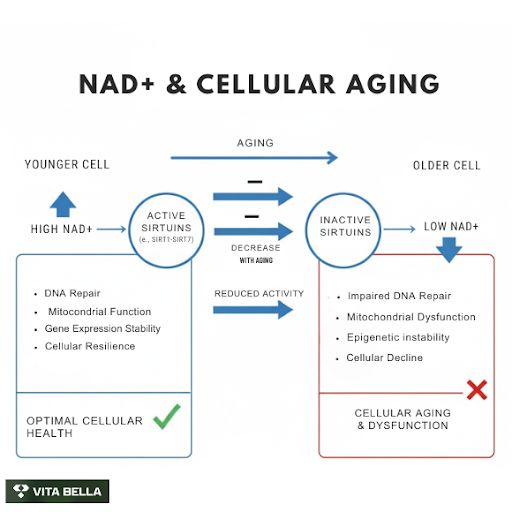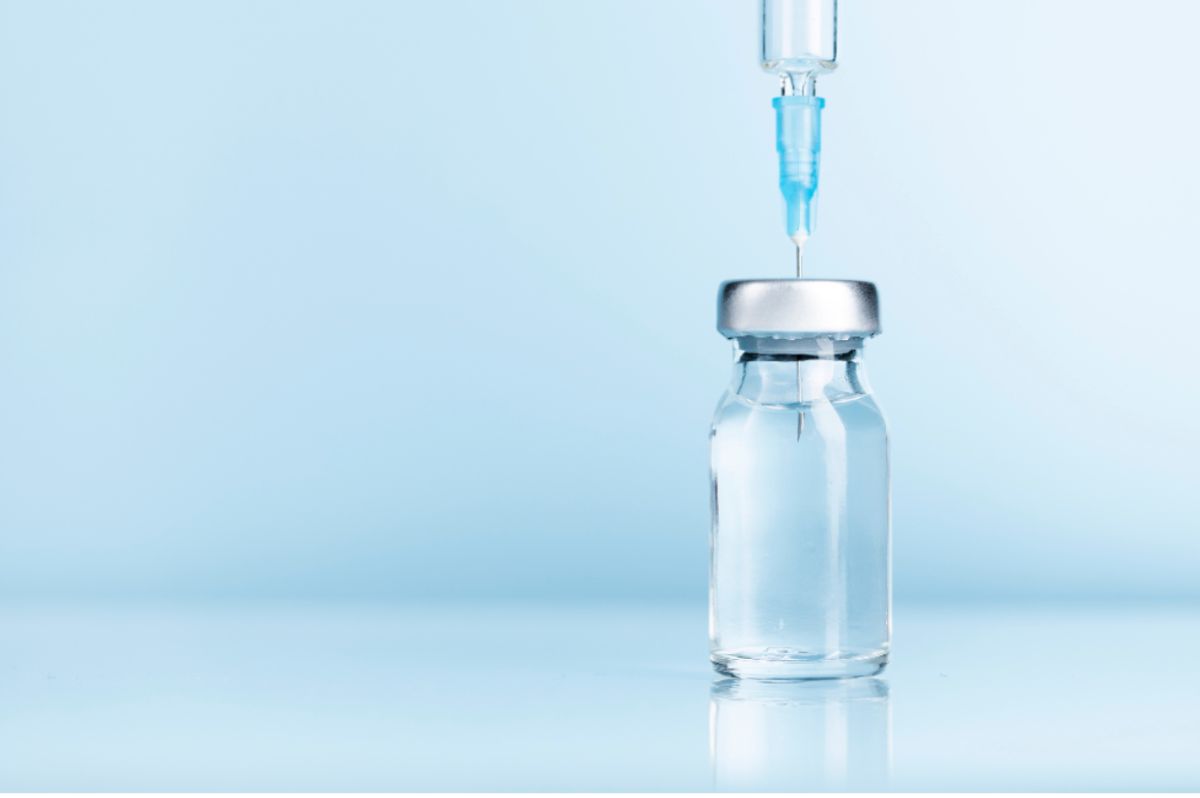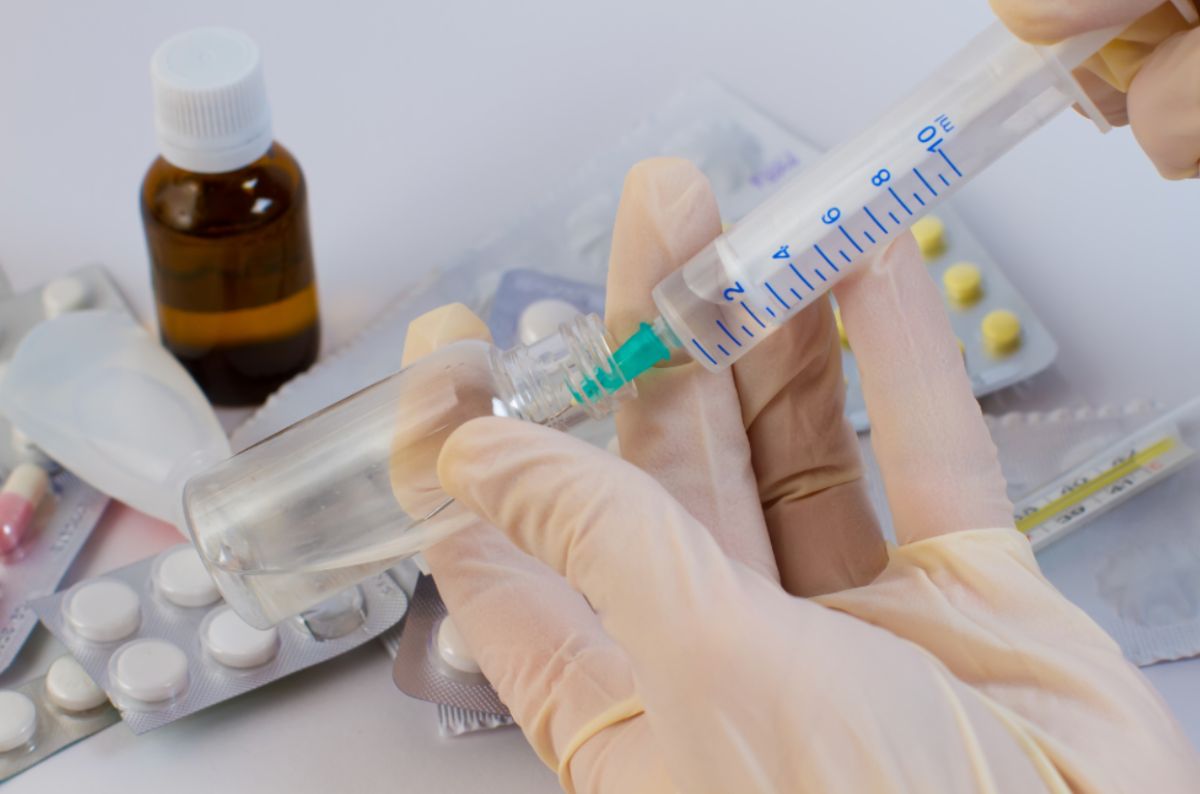Aging is certain, but science is uncovering ways to slow it down at the cellular level. One of the most promising areas of research focuses on Nicotinamide Adenine Dinucleotide (NAD+) 1, a vital coenzyme found in every living cell. This decline has been linked to age-related conditions such as:
Metabolic disorders
Cancer
Neurodegeneration
Cardiovascular disease
Shifts in tissue composition and metabolism may cause age-related decreases 2 in NAD+, an important molecule. There is considerable interest in how supplements affect human health, as methods to boost NAD+ levels have shown promise in treating a variety of illnesses.
Don’t let declining NAD+ levels slow you down. At Vita Bella, we offer clinically supervised, research-backed NAD+ injections designed to restore energy, support cellular repair, and promote graceful aging. Discover the difference science can make, start your journey to vitality and longevity today!
The Science Behind NAD+ and Aging
All live cells contain the coenzyme nicotinamide adenine dinucleotide (NAD+). It functions as a:
Cosubstrate for other enzymes, including the sirtuins and poly(adenosine diphosphate ribose) polymerases, and...
The crucial coenzyme for enzymes that drive reduction-oxidation processes by transporting electrons from one reaction to another.
Aging causes changes in cellular NAD+ concentrations, and regulating NAD+ synthesis or consumption may extend life and improve health. According to a research study 3, reduced NAD+ concentrations are involved in the aging process and the pathophysiology of chronic aging illnesses.
NAD+ and sirtuins 4 have a close functional relationship that is essential for controlling physiological strength and aging. Moreover, the breakdown of NAMPT-mediated NAD+ biosynthesis and PARP-mediated NAD+ depletion causes a decrease in NAD+ availability as people age.
This results in a decrease in sirtuin activities and impacts both cellular and systemic communication between the nucleus, mitochondria, hypothalamus and adipose tissue. The relationship between NAD+ and sirtuins will offer a deeper mechanistic understanding of how energy metabolism influences aging and life expectancy.
How NAD+ Injections Work vs. Lifestyle & Supplements
Finding strategies to improve NAD+ status may have an impact on the aging process and related metabolic aftereffects, as it is believed that the concentration of NAD+ declines with age in:
Human skin
Blood
Liver
Muscles
Brain
NAD+ injection straight into the bloodstream speeds up absorption. In vitro and in vivo studies 5 have shown that NMN supplementation raises NAD+ concentration and may help prevent aging-related conditions like oxidative stress, DNA damage, neurodegeneration, and inflammatory reactions.
Research study 6 describes that after an intraperitoneal injection, NMN has been demonstrated to increase NAD+ levels in the hippocampus and hypothalamus, suggesting that it can cross the blood-brain barrier (BBB).
Moreover, according to the latest research 7, administering NAD+ precursors, such as nicotinamide riboside (NR) and NMN, which are also found in natural foods like meat, vegetables and cow's milk can raise NAD+ concentrations in human blood and tissue. It indicates that modifying NAD+ metabolism may be a useful nutritional intervention target. Essential and well-studied lifestyle strategies 8 to extend lifespan include:
Aerobic exercise
Fasting
Glucose deprivation
Calorie restriction
These strategies raise NAD+ by activating the enzyme NAMPT, which is the rate-limiting enzyme in mammals that produces NAD+.

What Research Says: Can NAD+ Injections Slow Aging?
1. Preclinical Evidence
Study 9 conducted on animals, shows that increasing levels of NAD+ reversed:
Age-associated degeneration
Improved muscular endurance
Changed metabolic profiles
Restored the function of organs
In vivo NAD+ restoration has been thoroughly studied and shown to provide whole-body advantages. It has been shown that NAD+ levels in mice double by the middle of life, aligning with the development of certain age-related problems.
Reversing several metabolic disorders and improving cardiovascular health were the outcomes of successfully restoring NAD+ to younger levels. Along with improvements in mitochondrial efficiency, and ATP generation. The quantity and strength of muscle stem cells and improvements in muscle performance and strength were also seen.
Other studies 10 also show that NMN and NR injections rapidly raise plasma nicotinamide, confirming their potential for fast NAD+ conversion.
2. Human Insights
Initial data on human studies show 11 that NAD supplements may promote healthy aging. The study had following outcomes:
A randomized controlled trial with 120 healthy adults (ages 60–80) showed that NR supplementation (250–500 mg daily) significantly raised blood NAD+ levels within 4 weeks and sustained them over 8 weeks.
Higher NAD+ concentrations were shown to be safely and effectively maintained with long-term usage.
Ready To Unlock the Power of Healthy Aging with NAD+ Injections?
Don’t just add years to your life; add life to your years. At Vita Bella, our premium NAD+ injections are formulated to support energy, cellular repair, and graceful aging. Take the first step toward lasting strength and fitness today!
FAQs
What are NAD+ injections, and how do they work?
NAD+ injections deliver nicotinamide adenine dinucleotide directly into the bloodstream, bypassing the digestive system. This boosts NAD+ levels more efficiently, supporting mitochondrial function, energy production, and cellular repair, key processes linked to slowing aging.
Are NAD+ injections safe for anti-aging purposes?
Yes, when administered under medical supervision, NAD+ injections are generally considered safe. Some people may experience mild side effects such as flushing, nausea, or fatigue. Always consult a licensed healthcare provider before starting therapy.
Can NAD+ injections really extend lifespan?
While research shows that NAD+ supplementation supports cellular health, improves metabolism, and may delay age-related decline, there is no conclusive human evidence proving that it directly extends lifespan. However, it may improve healthspan, the quality of life as you age.





















